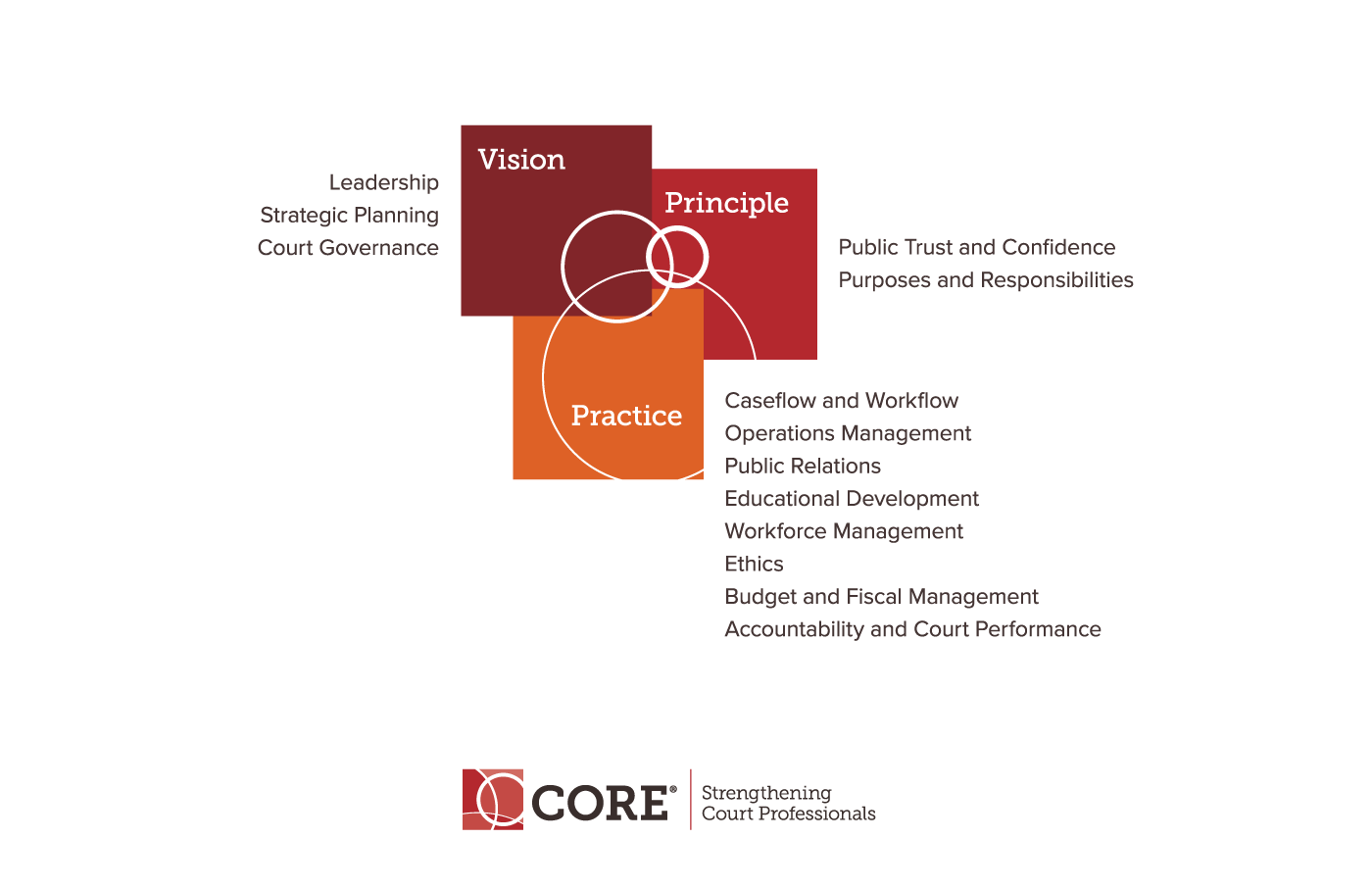Program Overview
Where to Start
Certification candidates may take courses through National Programs (2.5-day in-person courses), Virtual National Programs (4-half day Zoom courses), ICM partnership courses, the ICM Licensee Program and/or the ICM Consortium. Participants may contact their state Administrative Office of the Courts to learn if their state is either part of the ICM Consortium or the ICM Licensee Program. Click here to learn more about partnership opportunities and the Licensee Program.
It is ICM's policy that participants seeking program certification from ICM complete their course of study within a 7-year timeframe for each of the following two levels of certification -- Level One (CCM) and Level Two (CCE). Though courses may be taken in any order, all thirteen courses (6 CCM and 7 CCE) must be completed in order to earn the Certified Court Executive credential.
Please note that certification requirements may change in future years as ICM continually revises its curricula.
Check ICM’s course calendar page to view available offerings.
The courses constituting the Certified Court Executive certification program are listed below. Again, all CCM and CCE courses must be completed in order to earn the CCE credential.
| Current Course Title | Original Course Title |
|---|---|
| Educational Development | Education, Training & Development |
| Executive Decision-Making | New course |
| High Performance Court Framework | Course is being phased out |
| Leadership | No title change |
| Modern Court Governance | New course |
| Operations Management | Essential Components |
| Public Relations | Court Community Communication |
| Visioning & Strategic Planning | No title change |
ICM courses offer court managers the opportunity to expand their knowledge base and build new skills through the Certified Court Manager (CCM) or Certified Court Executive (CCE) programs.
Since 2011, the CCM and CCE curricula have been closely aligned with the National Association for Court Management (NACM) Core Competencies, now updated and known as the NACM Core. The NACM Core is a summation of the knowledge, skills, and abilities court professionals must have in order to be effective managers and dynamic leaders.
Click each Certified Court Executive course title below to see the course description.
Though courses may be taken in any order, all thirteen courses (6 CCM and 7 CCE) must be completed in order to earn the Certified Court Executive credential. Please note that certification requirements may change in future years as ICM continually revises its curricula.
Course Descriptions
Formerly known as "Education, Training & Development"
Description:
This course is designed to equip participants with the information necessary to develop, implement, sustain, evaluate and improve education for and development of court staff. Participants will learn the fundamentals of adult education and instructional design and will explore the unique educational environment of the courts. Throughout the course, participants will assess current educational efforts at their own courts and learn how to employ education to enhance daily operations as well as to achieve their court’s mission or strategic plan.
As a result of this course, participants will be able to:
- Describe the unique educational environment of the courts and determine how education can promote improvements in court operations.
- Identify resources that can support education and describe effective approaches to obtaining those resources.
- Identify ways to evaluate the short and long-term outcomes of education.
- Describe how court administrators can use education to support new and promoted employees, enhance staff performance at different career points, and serve as an effective intervention to address gaps in knowledge, skills, and abilities.
- Create an action plan for implementing education in their own court.
Description:
The Executive Decision-Making course provides court leaders with tools they can use to enhance a court’s effectiveness, efficiency, fairness, and accessibility. The course teaches court leaders to: evaluate data; be a knowledgeable consumer of research studies; diagnose court operations challenges; and create and communicate proposed solutions.
As a result of participating in this course, participants will be able to:
- Describe how leadership styles, court culture and governance structures impact executive decision-making.
- Apply leadership frameworks such as loosely coupled systems, productive pairs and servant leadership, to enhance executive decision making in their own court.
- Create strategies to apply data-driven principles, evidence-based practices, national standards and best practices to address local court challenges and strategic priorities.
- Implement strategies to adapt to the changing environment, including leveraging “big data,” using artificial intelligence, incorporating visual data displays, and using business intelligence and analytic tools.
- Examine the ethical considerations inherent in the challenges of executive decision-making.
Description:
Leaders in the 21st century must inspire, communicate a vision, and master the workforce and work environment. In this course, participants will become familiar with the major theories and practices of leadership, including what it takes to exercise leadership as an individual, as the leader of teams, and as the leader of an organization that must work effectively with other branches of government and stakeholders.
As a result of participating in this course, participants should be able to:
- Identify traits, activities, and models of leadership.
- Explore the differences between leadership and management and the value each brings to an organization.
- Demonstrate personal and organizational legitimacy through transparency and accountability in leadership.
- Discuss the relationships and connections needed for leaders to be effective in an interdependent judicial system.
- Advocate for a governance structure that promotes effective communication, collaborative decision-making, and teamwork.
Description:
Court governance refers tothe policies, procedures, and traditions that determine how courts are administered, how court administration decisions are made, and who has decision-making authority. Effective court governance is the foundation for ensuring that courts function in a predictable and consistent manner that supports fundamental principles, such as access to justice and due process of law. A court governance structure should provide guidance to court managers and supervisors about how policies and practices are decided and implemented. The purpose of the Modern Court Governance course is to provide court leaders with tools they can use to preserve and enhance governance mechanisms used by the court.
As a result of participating in this course, participants will be able to:
- Identify key court governance principles.
- Examine federal, state, and local court governance models.
- Assess benefits and challenges associated with court governance models and identify potential areas for change in their own court.
- Explore the use of court governance principles to guide management, planning, and leadership decisions.
- Discuss the role of court managers in fostering a system of responsive and effective modern court governance.
Formerly known as "Essential Components"
Description:
In this course, participants will examine programs and services that support the adjudication of cases, but that may or may not be under the direct control of the court. Whether or not the court has direct control over the management of essential programs and services, court leaders must understand the needs, nature, and impact of court-related programs to help ensure that these activities contribute to effective court administration and the overall quality of justice. Examples of operations discussed in the course include COOP plans, records management, managing problem-solving courts, and specialty dockets.
As a result of participating in this course, participants will be able to:
- Identify operations that are court-related, but not under complete control of court administration.
- Discuss how each of these operations fits into the court organization.
- Discuss how various operations support the role and values of the court as an institution.
- Identify ways to collaborate with stakeholders to improve the management and effectiveness of operations using technology and appropriate service delivery methods.
- Develop performance and evaluation criteria for these services and programs so that efficiency promotes the overall effectiveness of the court as an institution.
Formerly known as "Court Community Communication"
Description:
The Public Relations course provides participants with tools they can use to promote community engagement and increase public trust and confidence, while fulfilling their duty to provide administrative and case-related information to the media and the public via electronic, written, and verbal communications. The course teaches court leaders and managers how to craft and deliver messages about court activities and performance, as well as to educate staff about walking the fine line between providing legal advice vs. legal information. Participants will also improve their skills in communicating effectively with the media and consider requirements for communicating in a crisis.
As a result of participating in this course, participants will be able to:
- Discuss how sources of information about the courts influence public perceptions.
- Identify how public relations can have a positive impact on public trust and confidence in the courts.
- Examine the roles of customer service, community engagement programs, communication strategies, and public information programs in promoting public trust and confidence in the courts.
- Identify best practices for how the courts should manage media relations.
- Demonstrate skills and techniques that can be used to help the public understand and support the courts.
Description:
The Visioning & Strategic Planning course gives court leaders and managers the tools they need to develop a vision and achieve goals using strategic planning. Court leaders often assume that the vision and mission of a court is self-evident and that the process of achieving consensus for a vision is a waste of time. This course demonstrates that having a vision and a strategic plan is an effective way to define priorities and allocate limited court resources.
As a result of participating in this course, participants will be able to:
- Examine court performance issues from a strategic perspective.
- Discuss the importance of encouraging strategic thinking and decision making at every level of the organization.
- Apply the techniques involved in strategic planning, including developing mission and vision statements, and goals and action plans.
- Discuss the leadership, teamwork, and organizational foundations that are required to create and implement a strategic plan.
- Draft a plan for implementing a visioning and strategic planning process in their own court.

